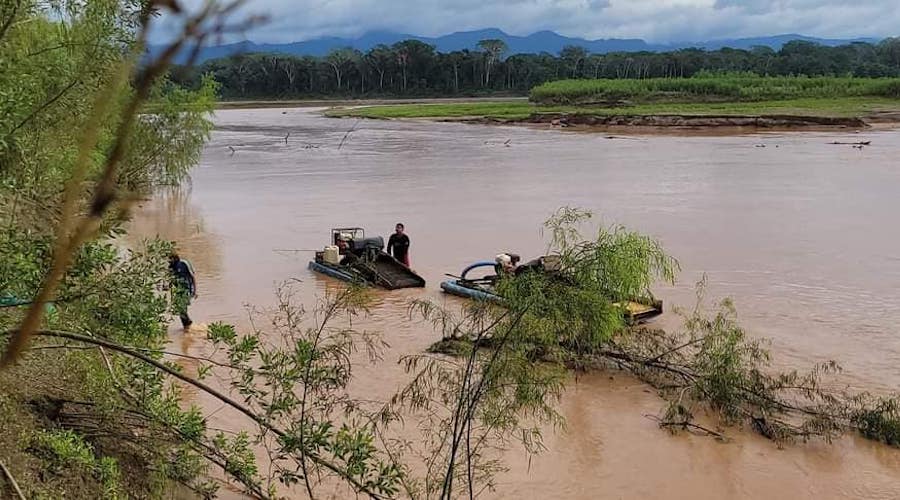Valentina Ruiz Leotaud | July 30, 2023 |

Illegal mining equipment in Bolivia’s Amazon.
(Image by CPILAP, Facebook.)
The Indigenous Peoples of La Paz Central Group (CPILAP) issued a local state of emergency in the Bolivian department of La Paz following an attempt by gold mining cooperatives to modify the zoning of protected areas in the northern part of the province.

“We are in a state of emergency and all the communities are ready to join efforts and defend our rights, in the face of any outside incursion done either by force or by trying to deceptively manipulate our people to gain access to Madidi and Pilón Laja”, CPILAP’s president, Gonzalo Oliver Terrazas, said in a statement made public through social media.
Madidi is an almost 19,000 square-kilometre national park in the upper Amazon river basin. Ranging from the Andes Mountains to the rainforests of the Tuichi River, it is recognized as the world’s most biologically diverse national park. It is also part of one of the largest protected areas in the world together with the nearby protected areas of Manuripi-Heath and Apolobamba, and the Manu Biosphere Reserve.
Pilón Lajas, on the other hand, is a biosphere reserve and communal land that spans the departments of La Paz and Beni, in the northern part of the country.
This week, gold mining cooperatives threatened the Luis Arce administration with demonstrations if they don’t get an answer by August 21, 2023, related to their request to legally allow resource extraction in certain areas where such activities have been banned.
According to the Federation of Gold Mining Cooperatives of Bolivia, the sector has experienced massive growth and their demands should be tended to.
But in the view of Terrazas, the co-op’s announcement is “deceitful and manipulative,” and ignores the fact that any rezoning is the responsibility of the National Service for Protected Areas (Sernap) and must be carried out in full consensus with the Indigenous peoples who live in those territories.
The community leader, whose group represents 11 Indigenous organizations from seven First Nations, reminded authorities that on November 7, 2022, the government and CPILAP signed an agreement that nullified an attempt to rezone the protected areas in the northern La Paz department. Such an attempt was a deal signed between the Vice Ministry of the Environment, the National Service for Protected Areas, the Authority for the Inspection and Social Control of Forests and Land, and the Federation of Gold Mining Cooperatives of North La Paz.
The new agreement states that “the updating of the zoning of protected areas must be carried out with the participation of the Indigenous peoples and/or nations directly involved with the protected area, considering the sacred right to consultation under the sanction of nullity.”
The seven-point document also stipulates that when there is evidence of non-compliance with environmental regulations, “all illegal mining activities within protected areas, even if they are preconstituted, will be the subject of legal action to stop them and expel them from the protected areas.”
The Indigenous Peoples of La Paz Central Group (CPILAP) issued a local state of emergency in the Bolivian department of La Paz following an attempt by gold mining cooperatives to modify the zoning of protected areas in the northern part of the province.

“We are in a state of emergency and all the communities are ready to join efforts and defend our rights, in the face of any outside incursion done either by force or by trying to deceptively manipulate our people to gain access to Madidi and Pilón Laja”, CPILAP’s president, Gonzalo Oliver Terrazas, said in a statement made public through social media.
Madidi is an almost 19,000 square-kilometre national park in the upper Amazon river basin. Ranging from the Andes Mountains to the rainforests of the Tuichi River, it is recognized as the world’s most biologically diverse national park. It is also part of one of the largest protected areas in the world together with the nearby protected areas of Manuripi-Heath and Apolobamba, and the Manu Biosphere Reserve.
Pilón Lajas, on the other hand, is a biosphere reserve and communal land that spans the departments of La Paz and Beni, in the northern part of the country.
This week, gold mining cooperatives threatened the Luis Arce administration with demonstrations if they don’t get an answer by August 21, 2023, related to their request to legally allow resource extraction in certain areas where such activities have been banned.
According to the Federation of Gold Mining Cooperatives of Bolivia, the sector has experienced massive growth and their demands should be tended to.
But in the view of Terrazas, the co-op’s announcement is “deceitful and manipulative,” and ignores the fact that any rezoning is the responsibility of the National Service for Protected Areas (Sernap) and must be carried out in full consensus with the Indigenous peoples who live in those territories.
The community leader, whose group represents 11 Indigenous organizations from seven First Nations, reminded authorities that on November 7, 2022, the government and CPILAP signed an agreement that nullified an attempt to rezone the protected areas in the northern La Paz department. Such an attempt was a deal signed between the Vice Ministry of the Environment, the National Service for Protected Areas, the Authority for the Inspection and Social Control of Forests and Land, and the Federation of Gold Mining Cooperatives of North La Paz.
The new agreement states that “the updating of the zoning of protected areas must be carried out with the participation of the Indigenous peoples and/or nations directly involved with the protected area, considering the sacred right to consultation under the sanction of nullity.”
The seven-point document also stipulates that when there is evidence of non-compliance with environmental regulations, “all illegal mining activities within protected areas, even if they are preconstituted, will be the subject of legal action to stop them and expel them from the protected areas.”
No comments:
Post a Comment